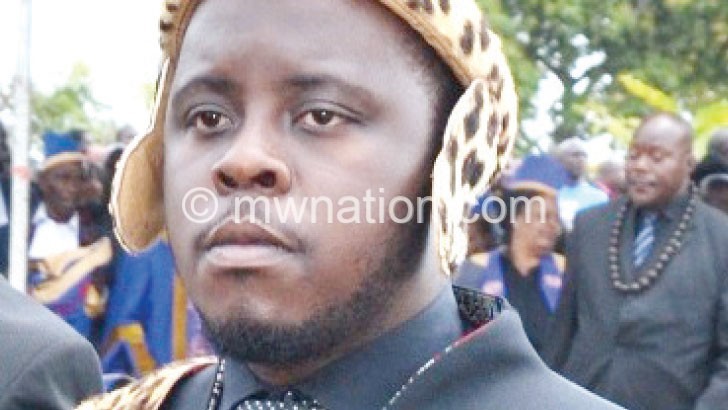Child marriage woes
One morning, people in Nimbire Village, Traditional Authority (T/A) Mlomba in Machinga woke up to the disturbing news that Amidu Frank, 19, had eloped with Khadija Yusufu, 13, (not her real name) to Blantyre.
Ministry of Gender, Children, Disability and Social Welfare officias in the district reported the matter to T/A Mlomba who, together with Chief Chibondo, referred the case to Machinga Police Station.
“This happened barely a few days after our efforts to withdraw the girl from the marriage, which had the blessing of the girl’s mother, proved futile,” says Annie Gabriel, Machinga district child protection officer.
She says the incident tore the family apart as the girl’s father frowned at the relationship while the mother approved it.

“I visited the parents to urge them to talk to their child to withdraw from the marriage and continue with her studies. However, the mother verbally harassed me.
“I then proceeded to T/A Mlomba and Chief Chibondo to intervene. There was no police action for some weeks after the matter was reported,” Gabriel explains.
It was this indecisiveness on the part of the police that gave the two an opportunity to leave the village.
Elsewhere, Martin Tembo and his wife Eliteke Kanyasko of Efelanja Village, T/A Mtwalo in Mzimba were struggling with a similar case.
Their 13-year-old daughter did not sleep in their house the previous night and was nowhere to be seen throughout the day.
A rigorous search for her sent them to utter paralysis as the discovery was too much to bear. Their little girl had married a man aged 20 in a neighbouring village of Chisangano in the two days she went missing.
They immediately reported the matter to Ekwendeni Police Unit who went and arrested the minor and her husband Timoteo Zgambo. The two were released after spending a night in the cooler. They were told to part ways since the girl was too young.
Unbeknown to the girl, she was already pregnant. This discovery disturbed her parents.
Nevertheless, their resolve to have her get educated compelled them not to send her into marriage. However, Zgambo went ahead and married the 13-year-old, leaving her parents hopeless.
The two stories, though different, share misfortunes and implications of child marriages.
Although the amendment of the laws in 2017 to push the marriage age to 18 was lauded as a significant milestone, the vice persists in the country.
It is not surprising, therefore, that statistics on child marriages by World Vision Malawi (WVM) released in August 2019 paint a gloomy picture.
At least 42 percent of young girls in Malawi get married before reaching their 18th birthday; while the new marriage law is yet to be enforced.
All this is happening when Malawi is among 20 African countries which committed to end girl child marriages by 2020 under UN Ministerial Commitment on Comprehensive Sexuality, Education and Sexual Reproductive Health Services for Adolescents.
Paramount Chief Kyungu of Karonga says the fight against child marriages can be won if policies are reviewed and practised.
“Government and all its partners need to engage an extra gear in changing people’s mindset on child marriages,” Kyungu says.
T/A Mlomba, however, blames the Malawi Police Service (MPS) for treating child marriages with kid gloves.
“The police are not helping us. Each time we report such cases to them, they ignore us. This renders our efforts futile,” she says.
The chief also blames the elopement of Yusufu to police’s indecision.
“Government needs to devise guiding policies on how the police and courts should handle cases of child marriages. They should know that such cases require swift action,” Mlomba says.
Inkosi ya Makosi Gomani V, who is WVM Ambassador for ending child marriages, appeals to the police not to grant bail to perpetrators of child marriages.
During one of his engagements in Ntcheu, Gomani told the media that chiefs need to complement the police in fighting against child marriages.
“We need to develop a policy that should dethrone all chiefs that overlook young girls as they get married willy-nilly,” he said.
However, National Police spokesperson James Kadadzera pushes the blame to the courts for granting bail to perpetrators of child marriages.
“As police, we do not give bail to anyone suspected of defiling a minor. We treat child marriages as defilement such that no bail can be granted.
“If the country sees that we are not winning this fight; let us hold hands to revisit the policies and avoid the blame-game,” he says.
T/A Kachindamoto of Dedza, who is also a champion for girl-child education, supports the idea of strengthening the laws, stating that strong by-laws on child marriages have helped save her community from the vice.
Girls not Brides Malawi says on its official website that Malawi needs to work towards eliminating child, early and forced marriages by 2030 in line with target 5.3 of the Sustainable Development Goals. To this effect, Minister of Gender, Children, Disability and Social Welfare Mary Navicha says government will do everything to protect all children to ensure their survival, growth and development into full potential.





